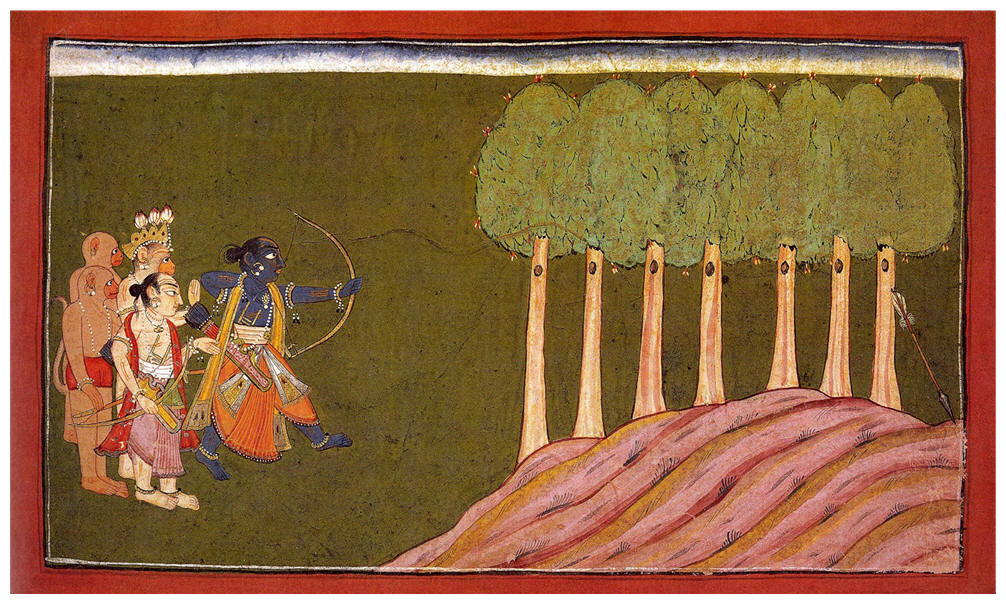In the
Ṛṣyamūka
hill, King Sugrīva
held court with his counsellors. Seeing the immense size of two
beautiful men, he asked Hanuman to take a look-see. Hanuman assumed the
form of a Brahmana.
Hanuman: Greetings to you men looking like Kṣatriyas,
one looking black and the other looking fair. Are you the two gods of
the Trinity (Brahma, Vishnu and Siva)? Are you Nara and Narayana?
Rāma:
I am the son of Dasaratha. He is Lakshmana, my brother. My wife Sita,
daughter of king Janaka was carried away by a demon. Tell us who
you are.
Hanuman in the appearance of a Brahmana froze out
of disbelief at seeing the Lord of his dreams, Rāma.
He prostrated immediately at the feet of Rāma.
His spine was tingling and no words could escape his lips.
He regained his composure, addressed his master Rāma
and sang his praises.
Hanuman: I am sorry I could not recognize you
because the Māyā
of yours kept me deluded.
He regained his composure and showed his monkey
form to Rāma
and Lakshmana. Rāma
embraced him with tears wetting the shoulders of Hanuman.
Rāma: You are as dear as Lakshmana is.
Hanuman: My Lord, Sugrīva
the chief of monkeys is staying up on the hill.
Please offer your friendship to him. He will deploy a million
monkeys in search of Sita.
Hanuman lifted both brothers, put them on his
shoulders and walked towards Sugrīva.
Sugrīva
recognized both, walked up to them to greet, and paid homage by bowing
his head at Rāma's
feet. The kingly duo embraced Sugrīva.
Hanuman gave a narrative of what happened to Sugrīva
and lit a fire as witness to the friendship between Rāma
and Sugrīva.
Sugrīva:
When I was holding court with my advisers, I saw a divine-looking woman,
carried in the air by the enemy, crying Rāma,
Rāma
and dropping a scarf when she saw us.
Rāma
asked for and was given the scarf by Sugrīva,
which Rāma
pressed to his bosom.
Sugrīva:
O Rāma
of Raghu lineage. I will help you to bring back the daughter of Janaka
to you.
Rāma:
Sugrīva,
tell me why are you staying in the forest?
Sugrīva:
Vāli
and I are identical twins. Demon Māyāvi
challenged Vāli
for a fight and entered a mountain cave chased by Vāli.
Vāli
told me if he did not return in a fortnight, I should assume he was
dead. I waited for a month and saw a torrent of blood flowing from the
mouth of the cave. I assumed Vāli
was dead. I feared the
demon and so blocked the entrance to the cave with a rock to prevent the demon from
escaping. The ministers of the town installed me as the king.
Vāli
returned after killing the demon and held a grudge against
me. He beat me up to a pulp
and robbed me of my wealth and my wife Ruma.
Hearing this from Sugrīva,
Rāma
made a promise to kill Vāli,
even if he took refuge with Brahma or Siva.
Sugrīva:
Vāli is
very strong and staunch in battle. I need some sort of proof you are as
strong as you state.
Rāma took the cue and shot an arrow through seven Sal trees (குங்கிலியம்). The exiting arrow pierced a huge boulder and split it into two pieces. See in the photo how 7 trees can line up neatly for the feat performed by Rāma .
Sugrīva
was pleased that Rāma
would help him kill Vāli and restore his kingdom.
Hearing that Sugrīva
had a friend in Rāma
and Lakshmana, Vāli's
wife pleaded with her husband Vāli,
not to fight the two brothers, Rāma
and Lakshmana.
Vāli
to his wife: Listen. Rāma
is fair. If he killed me, I will go to heaven.
Vāli
beat up Sugrīva,
who fled from the scene and returned to Rāma.
Rāma by
his touch made Sugrīva
strong and sent him back to fight Vāli.
They fought and Rāma
was watching them from behind a tree.
Sugrīva
was becoming weak. Rāma
shot Vāli
in his heart with his stealthy arrow.
Vāli got up and sat looking at the feet of Rāma, thinking he would soon be liberated (Moksa). Wounded, he excoriated Rāma for his ensuing death because he did no harm to Rāma.
Vāli: You should have come to me first for the rescue of Sita. I once carried Ravana by my tail. The abductor is no match for me. Your father Dasaratha helped my father Indra to defeat the Raksasas.
Vāli asked Rāma two questions:
1. What was my crime? You made my wife a widow.
2. Where is your right to kill me, even if I committed a crime agaisnt my twin brother?
Rāma asnwered Vāli as follows.
Your twin brother was younger than you and so should be treated like a son. You should have forgiven him, because he had love and respect for you. When you retook the throne from Sugrīva, you sinned by taking his wife and consorting with her. Your kingdom was taken by Mayavi and you are no more a king. How could you help me?
His wife Tara was wailing. Rāma
comforted her. Rāma
ordered Sugrīva
to perform funeral rites for Vāli,
and Lakshmana to install Sugrīva
as the king.

